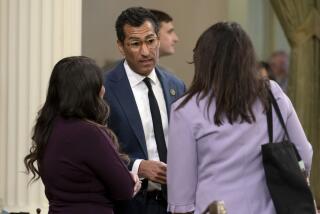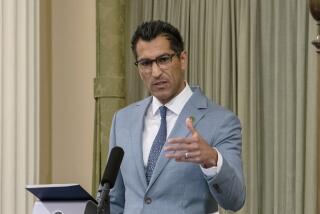Lawmakers Consider New Proof Burden in IRS Disputes
- Share via
WASHINGTON — Congress is considering turning the tables on the Internal Revenue Service. Proposed legislation would force the agency to prove taxpayers are wrong in disputed cases, rather than requiring filers to prove they are right.
“You might as well repeal the income-tax law and pass the hat,” IRS Commissioner Margaret Milner Richardson told the House Ways and Means oversight subcommittee on Friday, arguing that the change would destroy the tax system.
Taxpayers who are challenged in audits must now produce receipts and other documents to justify their deductions. The proposed change would send the IRS searching for evidence to disprove the claim of an uncooperative filer.
Richardson and Deputy Assistant Treasury Secretary Cynthia G. Beerbower said they support many congressional proposals to strengthen taxpayer rights but that they adamantly oppose a bill sponsored by Rep. James A. Traficant Jr. (D-Ohio) that would shift the burden of proof in civil tax cases. (The IRS already has the burden of proof in criminal cases and civil cases involving fraud.)
“An accused mass murderer has more rights than a taxpayer fingered by the IRS,” Traficant said in a statement to the subcommittee. “Jeffrey Dahmer was considered innocent until proven guilty. Mom-and-pop small-business owners, however, are not afforded this protection.”
Beerbower said a “longstanding and well-established legal doctrine” in all civil proceedings, not just tax cases, is that the party that has control of the facts has the burden of proof.
Shifting the burden of proof, she said, would force the IRS to intrude into taxpayers’ lives far more than it does now, interviewing people other than the taxpayer and summoning information from third parties such as banks and credit card companies.
“As a result, the simplest audit would become a costly nightmare if the taxpayer refuses to cooperate,” she said.
Richardson said the change would make it so easy to claim phony deductions, to the disadvantage of honest taxpayers, that “passage . . . would destroy our voluntary compliance system.”
Four former IRS commissioners--Donald Alexander, Lawrence Gibbs, Fred Goldberg and Sheldon Cohen--submitted testimony backing Richardson’s position.
Traficant, a longtime crusader against the IRS, has his salary garnisheed in connection with a tax case he lost in the mid-1980s. It stemmed from a criminal charge, for which he was acquitted, when he was a candidate for county sheriff in Ohio.
Subcommittee members responded coolly or not at all to his idea but said they may seek to reduce the taxpayer’s burden of proof in one area. Taxpayer Bill of Rights legislation enacted in 1988 allows taxpayers who win their cases with the IRS to seek reimbursement for legal fees.
But subcommittee Chairwoman Nancy L. Johnson (R-Conn.) said that in practice, most taxpayers find it very difficult to prove the IRS “was not substantially justified in maintaining its position” even when it loses the case.
Johnson said she hopes this year to enact what she calls a Taxpayer Bill of Rights II. Among provisions being considered are expanding the power of the IRS ombudsman to issue orders protecting taxpayers, requirements for the IRS to corroborate information on reports filed by employers and banks, and increasing the IRS’ authority to waive interest on late taxes. She also said measures are needed to protect confidentiality.
More to Read
Get the L.A. Times Politics newsletter
Deeply reported insights into legislation, politics and policy from Sacramento, Washington and beyond. In your inbox twice per week.
You may occasionally receive promotional content from the Los Angeles Times.










